The Coconut Tree
The coconut tree, also known as Cocos nucifera, is a versatile and iconic tree that is commonly found in tropical regions around the world. It is a member of the palm family (Arecaceae) and is renowned for its various uses and benefits.

source
Here are some key characteristics and information about the coconut tree:
Appearance: Coconut trees have a tall, slender trunk that can reach heights of up to 30 meters (98 feet). The trunk is typically curved or slightly leaning, with a diameter of around 30 centimeters (12 inches). The tree's crown is made up of long, feathery leaves that can grow up to 6 meters (20 feet) in length.
Distribution: Coconut trees are native to tropical regions, particularly in areas with sandy soil and abundant sunlight. They are commonly found in coastal areas and islands throughout the tropics, including Southeast Asia, India, the Pacific Islands, and parts of Africa and South America.
Coconuts: The fruit of the coconut tree is the coconut, which is known for its hard, fibrous outer husk and its large, round seed or "nut" inside. The husk is typically brown and can be used to make various products like ropes, mats, and brushes. The nut itself has a hard, woody shell and contains a layer of edible white flesh called the "coconut meat" and a liquid known as "coconut water."
Uses: The coconut tree is often referred to as the "tree of life" due to its wide range of uses. Some of the common uses include:
Food: The coconut meat is used in various culinary preparations, both in fresh and dried forms. It is a versatile ingredient used in cooking, baking, and the production of coconut milk, coconut oil, and desiccated coconut.
Beverages: Coconut water is a refreshing and nutritious drink consumed worldwide. It is known for its hydrating properties and is often marketed as a natural sports drink.
Fiber and materials: The husk of the coconut is a source of coir fiber, which is used to make ropes, mats, brushes, and other products. The trunk can be used as timber for construction.
Oil and cosmetics: Coconut oil, derived from the meat of the coconut, is widely used in cooking, cosmetics, and traditional medicine. It is known for its moisturizing properties and is used in various beauty and skincare products.
Traditional medicine: Different parts of the coconut tree, including the roots, leaves, and coconut water, have been used in traditional medicine for various purposes, such as treating skin conditions, digestive issues, and respiratory ailments.
Cultural significance: Coconuts and coconut trees hold great cultural significance in many tropical regions. They are often associated with tropical paradises, beaches, and leisure. In some cultures, coconut trees are considered sacred and are used in religious rituals and ceremonies.
Environmental benefits: Coconut trees are beneficial for the environment as well. They help prevent soil erosion along coastlines, provide shade and habitat for various plant and animal species, and contribute to the overall biodiversity of tropical ecosystems.
The coconut tree is a remarkable plant with numerous practical uses and cultural importance. It is an integral part of tropical landscapes and plays a vital role in the lives of people living in these regions.

source
Coconut in Africa
Coconuts are not native to Africa, but they have been introduced to various parts of the continent and have become a significant crop in certain regions.
Here are some key points about coconuts in Africa:
Coastal Regions: Coconuts are primarily grown in the coastal regions of Africa, where the climate is warm, humid, and suitable for coconut cultivation. Countries along the eastern and western coastlines, such as Mozambique, Tanzania, Kenya, Nigeria, Ghana, and Ivory Coast, have significant coconut production.
Economic Importance: Coconuts play an important role in the economy of several African countries. They are a source of income for many small-scale farmers and provide employment opportunities in coconut plantations and processing industries. The sale of coconut products, such as coconut oil, coconut milk, and desiccated coconut, contributes to local and international trade.
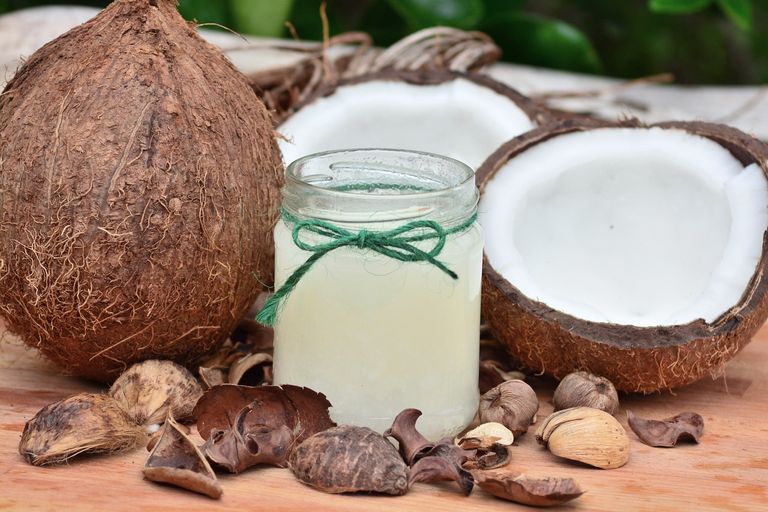
source
Uses: Coconuts in Africa are utilized in various ways:
1 Food and Beverage: The coconut meat and coconut water are consumed as food and beverages. Fresh coconuts are popular for their refreshing water and can be consumed as a beverage or used in cooking and culinary preparations.
Oil Production: Coconut oil, extracted from the meat of mature coconuts, is used for cooking, frying, and as an ingredient in traditional African dishes. It is also used in cosmetics, soaps, and skincare products.
Crafts and Fiber: The husk of the coconut, known as coir, is used to make ropes, mats, baskets, and other handicrafts. Coir fiber is also used for erosion control and soil stabilization.
Challenges: Despite the economic potential of coconuts in Africa, there are challenges to their cultivation and production:
Climate Constraints: Coconuts require a warm, tropical climate with abundant sunlight and regular rainfall. In some areas, such as the interior regions of Africa, the climate may not be suitable for successful coconut cultivation.
Pests and Diseases: Coconuts are susceptible to various pests and diseases, including coconut mites, rhinoceros beetles, and lethal yellowing disease. Effective pest and disease management strategies are essential to maintain healthy coconut plantations.
Limited Infrastructure and Technology: In some regions, the lack of adequate infrastructure and technology hinders the efficient processing and value addition of coconut products. Improved post-harvest practices and access to markets are crucial for maximizing the economic benefits.
Research and Development: Efforts are being made to enhance coconut production and address challenges in Africa. Research institutions and organizations are involved in developing disease-resistant coconut varieties, improving agronomic practices, and promoting value-added products to increase the profitability and sustainability of coconut farming.
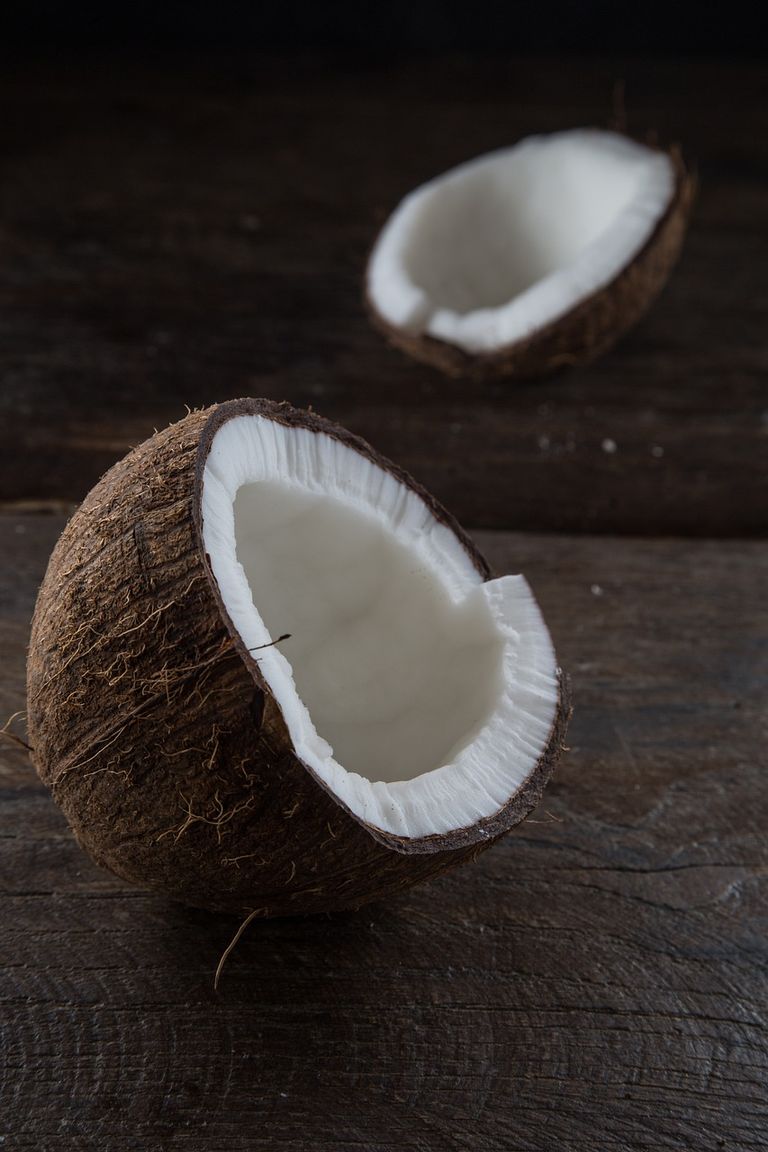
source
While coconuts are not native to Africa, they have found a place in the coastal regions and contribute to the livelihoods of communities and the overall agricultural landscape. The growth and potential of the coconut industry in Africa depend on factors such as climate suitability, infrastructure development, and investment in research and technology.
Coconut in Nigeria
Coconuts have a significant presence in Nigeria, particularly in the coastal regions where the climate is favorable for their cultivation.
Some information about coconuts in Nigeria:
Coconut Growing Areas: Coconuts are primarily grown in the southern coastal regions of Nigeria, including states such as Lagos, Ogun, Ondo, Edo, Delta, Rivers, and Cross River. These areas provide the warm and humid climate necessary for coconut cultivation.
Economic Importance: Coconuts play a vital role in the economy of Nigeria. The coconut industry provides income and employment opportunities for many small-scale farmers and supports local trade and export. It contributes to the country's agricultural sector and foreign exchange earnings.
Cultivation: Coconut farming in Nigeria is mainly carried out by smallholder farmers. The cultivation involves planting coconut seedlings in well-drained sandy soil near the coast. Coconut trees require regular rainfall, sunlight, and proper soil conditions. They can tolerate saline soils and are often planted in coastal areas.
Uses: Coconuts in Nigeria are utilized in various ways:
Food and Beverage: Fresh coconuts are popular for their refreshing water, which is consumed as a beverage. The coconut meat is used in cooking and baking, and it is a key ingredient in traditional Nigerian dishes and desserts.
Coconut Oil: Coconut oil, extracted from the meat of mature coconuts, is widely used in Nigeria for cooking, frying, and as a base for various local recipes. It is also used in the production of cosmetics, soaps, and hair care products.
Crafts and Fiber: The coconut husk, known as coir, is used in Nigeria to make ropes, mats, baskets, and other handicrafts. Coir fiber is also used for erosion control and horticultural purposes.
Livestock Feed: Coconut by-products, such as copra meal (the residue after oil extraction) and coconut cake, are used as animal feed, particularly for livestock and poultry.
Government Initiatives: The Nigerian government has recognized the importance of the coconut industry and has taken steps to support its development. Initiatives include providing training and technical assistance to farmers, promoting coconut value addition and processing, and facilitating access to credit and markets for coconut producers.
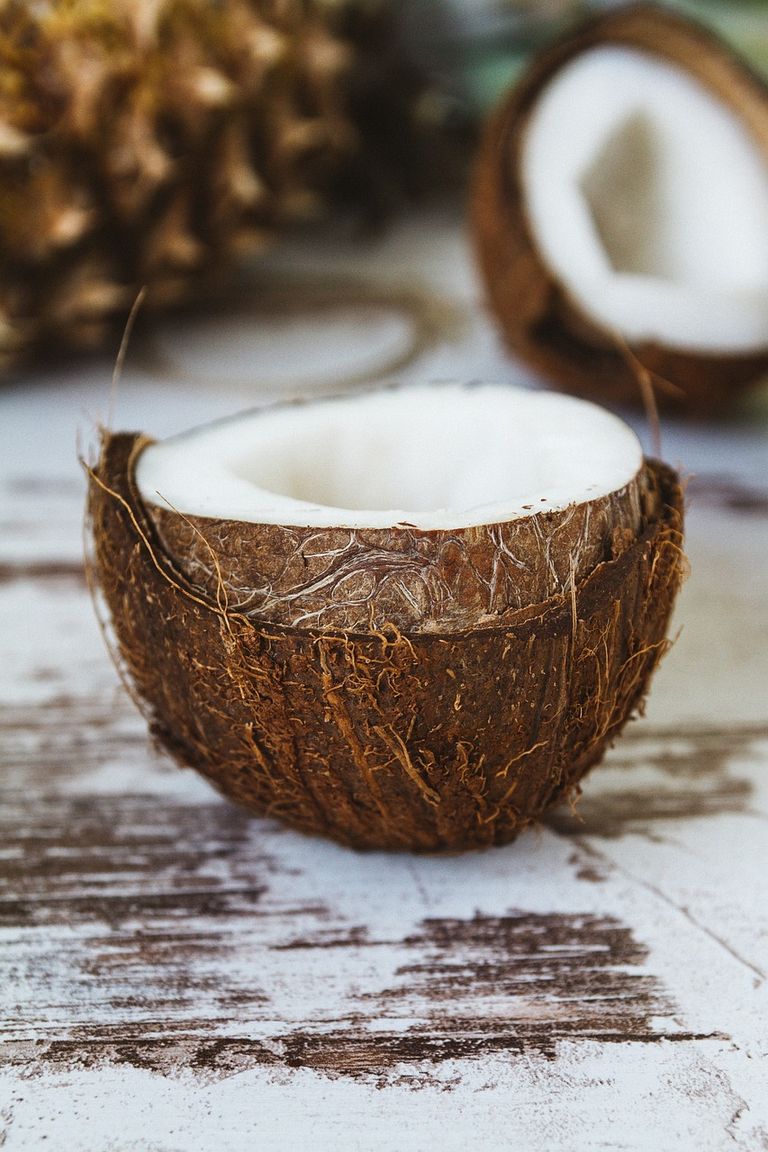
source
Challenges and Opportunities: Despite the potential of the coconut industry in Nigeria, there are challenges to overcome:
Pest and Disease Management: Coconuts are susceptible to pests and diseases, including rhinoceros beetles, red palm weevils, and lethal yellowing disease. Implementing effective pest management practices and disease control measures is crucial for sustainable coconut farming.
Infrastructure and Processing: Improving infrastructure and processing facilities is important to enhance the value addition and market competitiveness of Nigerian coconut products. This includes establishing coconut processing plants and improving post-harvest practices.
Market Development: Developing domestic and international markets for Nigerian coconut products is essential for expanding the industry. This involves promoting the consumption of coconut-based products, establishing quality standards, and exploring export opportunities.
Nigeria's coconut industry holds significant potential for economic growth and rural development. With proper support, infrastructure, and market development, the country can further harness the benefits of coconuts and create opportunities for farmers and entrepreneurs in the sector.
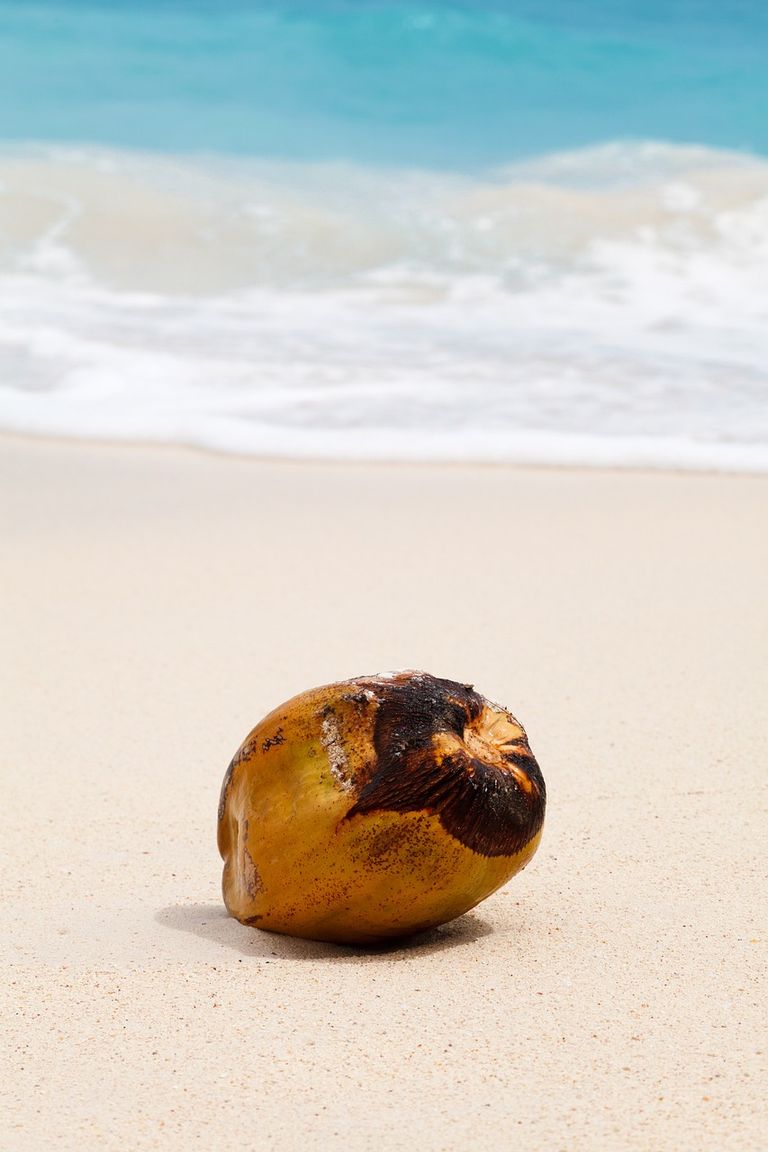
source
Regions that cultivate coconut in Nigeria
Coconut cultivation in Nigeria is primarily concentrated in the southern coastal regions of the country. Here are some of the main regions known for coconut farming in Nigeria:
Lagos State: Lagos State, located in southwestern Nigeria, is known for coconut cultivation, particularly in coastal areas such as Badagry, Epe, and Ikorodu. These regions have suitable climate and soil conditions for growing coconuts.
Ogun State: Ogun State, also in southwestern Nigeria, is another region where coconut farming is practiced. Areas such as Ijebu-Ode, Sagamu, and Abeokuta have a significant presence of coconut plantations.
Ondo State: Situated in the south-western part of Nigeria, Ondo State has a considerable coconut farming industry. The coastal areas, including Ondo town, Ode Aye, and Ilaje, are known for coconut cultivation.
Edo State: Edo State, located in southern Nigeria, has regions that are suitable for coconut farming. Areas such as Benin City, Auchi, and Ekpoma have coconut plantations.
Delta State: Delta State, situated in the southern part of Nigeria, is known for coconut cultivation. Regions like Warri, Sapele, and Ughelli have coconut plantations and contribute to the coconut industry in the state.
Rivers State: Rivers State, located in the Niger Delta region of Nigeria, is another significant region for coconut farming. Areas such as Port Harcourt, Bonny Island, and Opobo have coconut plantations.
Cross River State: Cross River State, situated in southern Nigeria, also has regions involved in coconut cultivation. Places like Calabar, Odukpani, and Akpabuyo have coconut farms.
These regions benefit from the coastal climate and suitable soil conditions that support the growth of coconuts. They have established coconut plantations and contribute to the overall coconut industry in Nigeria.
Coconut production in Nigeria
Coconut production in Nigeria has steadily increased over the years, and the country is recognized as one of the leading producers of coconuts in Africa. Here is an overview of coconut production in Nigeria:
Production Volume: Nigeria's annual coconut production varies, but it is estimated to be around 265,000 metric tons (MT) as of 2021. The production has been increasing due to the expansion of coconut plantations and improved cultivation practices.
Major Producing States: Coconut production is concentrated in several states in southern Nigeria. The major coconut-producing states include Lagos, Ogun, Ondo, Edo, Delta, Rivers, and Cross River. These states have favorable coastal climates and suitable soil conditions for coconut cultivation.
Farming Systems: Coconut farming in Nigeria is predominantly carried out by small-scale farmers. The farming systems range from traditional to semi-commercial, with farmers managing small to medium-sized plantations.
4.Varieties: Different coconut varieties are grown in Nigeria, including the Tall and Dwarf varieties. The Tall varieties are known for their commercial value, while Dwarf varieties are preferred for domestic consumption and local markets.
Processing and Value Addition: Coconut processing and value addition in Nigeria are gradually improving. Local processing includes the extraction of coconut oil, production of coconut milk, and the making of coconut-based snacks and desserts. Efforts are being made to enhance processing capabilities and diversify coconut-based products.
Export and Domestic Consumption: Nigeria exports coconut products, including coconut oil and desiccated coconut, to regional and international markets. However, a significant portion of the coconut production is consumed domestically, both as fresh coconuts and processed products. Coconut water is also consumed locally and is gaining popularity as a healthy beverage.
Government Initiatives and Support: The Nigerian government recognizes the economic potential of the coconut industry and has implemented initiatives to support its development. These include providing training and technical assistance to farmers, promoting improved cultivation practices, and facilitating access to credit and markets.
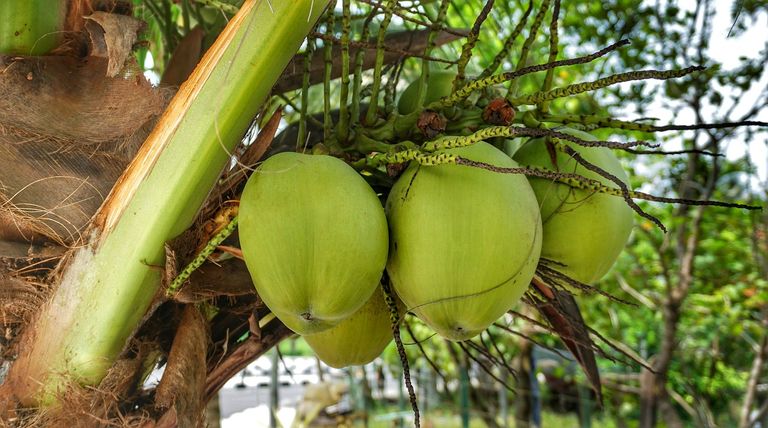
source
Challenges: The coconut industry in Nigeria faces several challenges, including:
Pest and Disease Management: Coconuts are susceptible to pests and diseases, such as rhinoceros beetles and lethal yellowing disease. Effective management strategies are essential to prevent yield losses.
Infrastructure and Processing: Improving infrastructure, such as access to irrigation, transportation, and processing facilities, is crucial for the growth of the coconut industry. This will help enhance post-harvest practices, value addition, and market competitiveness.
Market Development: Developing both domestic and international markets for Nigerian coconut products is important for the industry's growth. This requires market research, quality standards, and marketing strategies to promote Nigerian coconut products.
With continued efforts to address challenges and promote sustainable practices, Nigeria's coconut industry has the potential to further expand its production, contribute to the economy, and improve the livelihoods of coconut farmers.
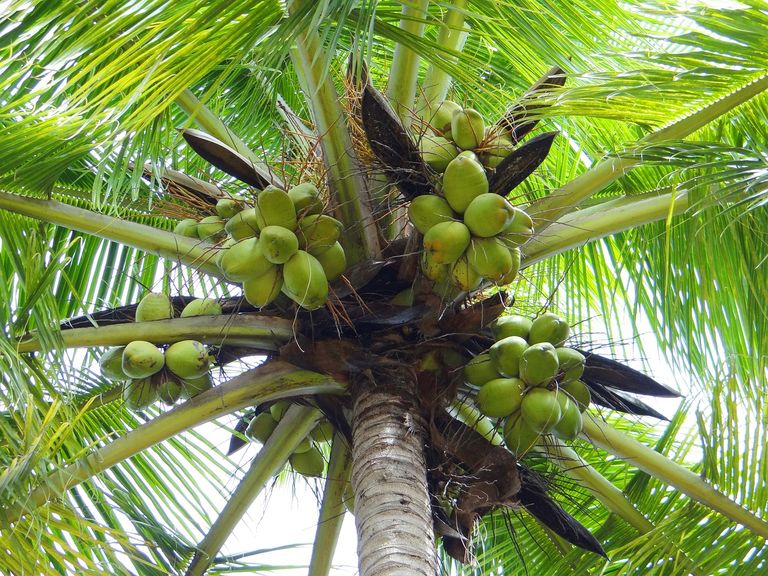
source
The uses of coconut in Nigeria
Coconuts in Nigeria are utilized in various ways, both for domestic consumption and commercial purposes. Here are some common uses of coconuts in Nigeria:
Food and Beverages: Coconuts are used as food and beverage ingredients in Nigeria. Some popular uses include:
Fresh Coconut Water: The water found inside the young green coconuts is a refreshing and nutritious beverage. It is consumed as a natural thirst quencher and is popular during hot weather.
Coconut Milk: Coconut milk is extracted from grated coconut meat. It is a key ingredient in many Nigerian dishes, especially in soups, stews, and sauces. Coconut milk adds richness, creaminess, and flavor to various traditional recipes.
Coconut Oil: Coconut oil, extracted from the mature coconut meat, is widely used in Nigerian cooking. It is used for frying, sautéing, and as a base for many local dishes. Coconut oil is also used in baking and as a flavoring agent.
Grated Coconut: The white, grated flesh of the coconut, known as desiccated coconut, is used in baking, confectionery, and as a topping for desserts and snacks.
Coconut-Based Snacks: Coconut is used to make a variety of Nigerian snacks, such as coconut candy, coconut chips, and coconut cookies. These snacks are popular for their distinct coconut flavor and texture.
Cosmetics and Personal Care: Coconut is valued for its beneficial properties in skincare and hair care. In Nigeria, coconut is used in various cosmetic and personal care products, including:
Coconut Oil: Coconut oil is a versatile ingredient in cosmetic products. It is used in lotions, creams, soaps, and hair care products due to its moisturizing and nourishing properties.
Hair Care: Coconut oil is often applied to the hair and scalp to moisturize, condition, and promote healthy hair growth. It is used in hair oils, shampoos, conditioners, and hair masks.
Traditional Medicine: In traditional Nigerian medicine, different parts of the coconut are used for their potential health benefits. Some traditional uses of coconut in herbal remedies include:
Skin Health: Coconut oil and coconut water are believed to have moisturizing, soothing, and anti-inflammatory properties for various skin conditions.
Digestive Health: Coconut water is sometimes used as a natural remedy for digestive ailments, such as indigestion and diarrhea.
Respiratory Health: In some traditional practices, coconut oil or coconut water is used to soothe coughs, sore throats, and respiratory infections.
Crafts and Household Products: The various parts of the coconut are used for crafting and making household products in Nigeria, such as:
Coir Fiber: The husk of the coconut, known as coir, is used to make ropes, mats, brushes, and other handicrafts. Coir is durable, biodegradable, and resistant to saltwater, making it suitable for coastal communities.
Coconut Shell Products: The hard outer shell of the coconut is used to make decorative items, jewelry, buttons, and kitchen utensils.
Charcoal: Coconut shells are also used to make charcoal, which is used for cooking, grilling, and as a source of fuel.

Source
These are some of the common uses of coconuts in Nigeria, where they are valued for their culinary, cosmetic, traditional medicine, and craft applications.
The coconut oil production
Coconut oil production involves extracting oil from the meat of mature coconuts. Here is an overview of the coconut oil production process:
Harvesting: Mature coconuts are harvested from coconut trees. The coconuts should be fully ripe, as this ensures a higher oil content in the meat.
Dehusking: The outer husk of the coconut is removed to expose the hard shell beneath.
Breaking and Deshelling: The hard shell of the coconut is cracked or broken to access the coconut meat inside. The coconut meat is then separated from the shell.
Grating or Shredding: The coconut meat is grated or shredded into small pieces to increase the surface area, making it easier to extract the oil.
Drying: The grated or shredded coconut meat is typically dried in the sun or using a drying machine. This helps reduce the moisture content of the meat, facilitating oil extraction.
Oil Extraction: There are two common methods used for coconut oil extraction:

source
Traditional Method: The dried coconut meat is pressed to extract the oil manually. This involves squeezing the grated coconut meat to release the oil, which is collected.
Mechanical Extraction: This method utilizes mechanical devices such as expeller presses or screw presses to extract oil from the dried coconut meat. The coconut meat is fed into the machine, which applies pressure to extract the oil.
Filtering and Purification: The extracted coconut oil is then passed through a filtration process to remove any impurities or remaining solids. This helps achieve a clearer and purer oil.
Optional Refining: Depending on the desired end product, the coconut oil may undergo further refining processes, such as refining, bleaching, and deodorizing (RBD) to remove any remaining impurities and odor.
Packaging: The final coconut oil is packaged into containers, such as bottles or drums, for distribution and sale.
Traditional methods of coconut oil extraction may vary, and in some cases, more modern extraction techniques or machinery may be employed. The specific process and equipment used can depend on factors such as the scale of production, available resources, and desired quality of the coconut oil.
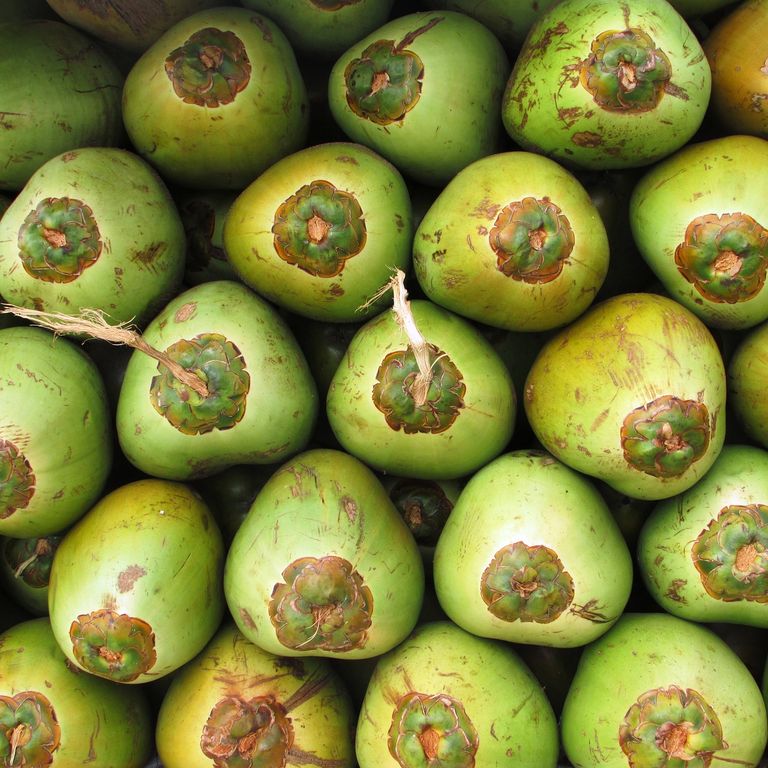
source
Coconut oil production can be carried out on both small-scale and large-scale levels, with local communities and commercial producers involved in the process. The extracted coconut oil is used in cooking, baking, as a flavoring agent, and as an ingredient in various food products. It is also used in cosmetic and personal care products, and has gained popularity for its potential health benefits and versatility.
Health benefits of eating coconut
Eating coconut offers several potential health benefits. Here are some of the key health benefits associated with consuming coconut:
Nutrient-Rich: Coconuts are rich in essential nutrients. They contain vitamins such as vitamin C, E, B-complex vitamins, and minerals like potassium, manganese, and copper. Coconuts also provide dietary fiber and healthy fats.
Heart Health: The saturated fats in coconuts are mainly medium-chain triglycerides (MCTs), which are metabolized differently than long-chain fatty acids. MCTs can increase the levels of beneficial HDL cholesterol and may have a positive effect on heart health. However, moderation is still important due to their high caloric content.
Weight Management: Coconuts can potentially aid in weight management. The MCTs in coconut oil are believed to increase satiety and reduce appetite, which can help control calorie intake. Additionally, the fiber content of coconuts contributes to feelings of fullness and supports digestive health.
Digestive Health: Coconut contains dietary fiber, which promotes regular bowel movements and helps prevent constipation. It may also support the growth of beneficial gut bacteria, promoting a healthy gut microbiome.
Antioxidant Properties: Coconuts contain antioxidants, such as phenolic compounds and vitamin E, which help protect the body against oxidative stress caused by free radicals. Antioxidants can contribute to overall health and may have anti-aging effects.
Skin Health: Coconut oil is widely used in skincare products and is believed to have moisturizing and nourishing properties for the skin. It can help improve skin hydration, reduce inflammation, and protect against skin damage.
Brain Health: The MCTs found in coconuts are converted into ketones in the liver, which can serve as an alternative energy source for the brain. Ketones may have potential benefits for brain health, including improved cognitive function and memory.
Immune Support: Coconuts contain lauric acid, which has antimicrobial and antiviral properties. Lauric acid is converted into monolaurin in the body, which can help support the immune system and protect against certain infections.
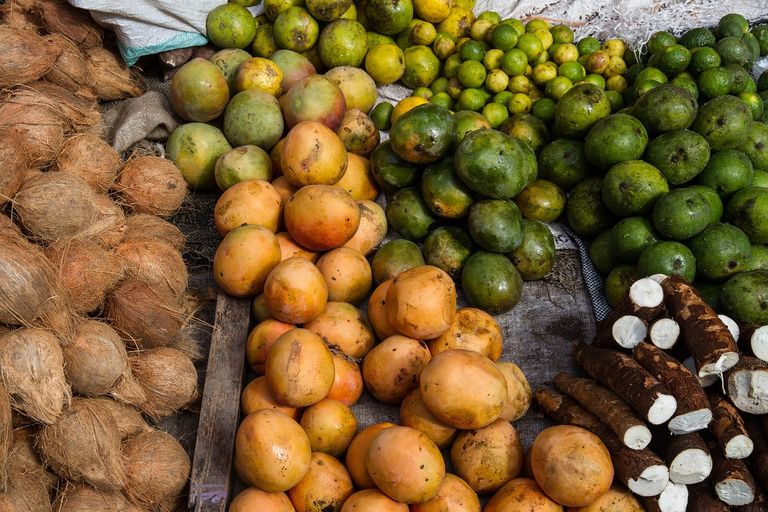
source
It's important to note that individual responses to coconut consumption may vary, and the health benefits may depend on factors such as overall diet, lifestyle, and individual health conditions. Additionally, moderation is key due to the high calorie and fat content of coconuts. It's advisable to incorporate coconuts as part of a balanced and varied diet to maximize their potential health benefits.
Conclusion
In conclusion, coconuts are versatile and offer various health benefits when incorporated into a balanced diet. They are rich in nutrients, including vitamins, minerals, dietary fiber, and healthy fats. Consuming coconuts can support heart health, weight management, digestive health, and provide antioxidant properties. Additionally, coconut oil is known for its moisturizing properties in skincare, and the MCTs found in coconuts may have potential benefits for brain health. However, it's important to consume coconuts in moderation due to their high caloric content. As with any dietary changes, it's advisable to consult with a healthcare professional or nutritionist to determine the best approach for your individual needs and health conditions.